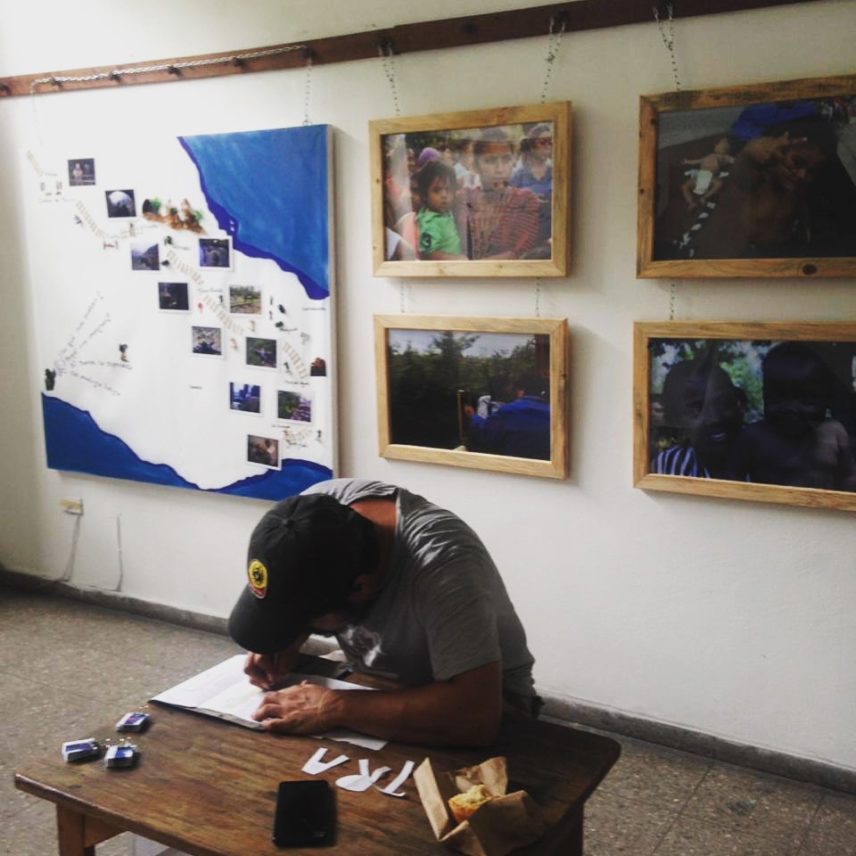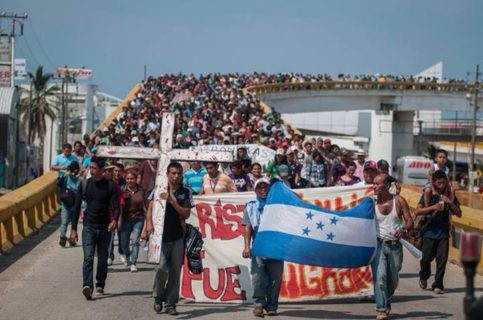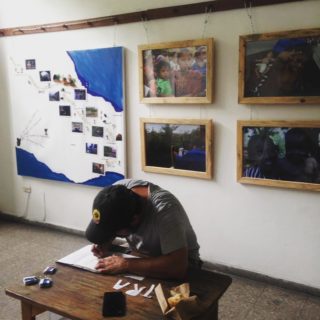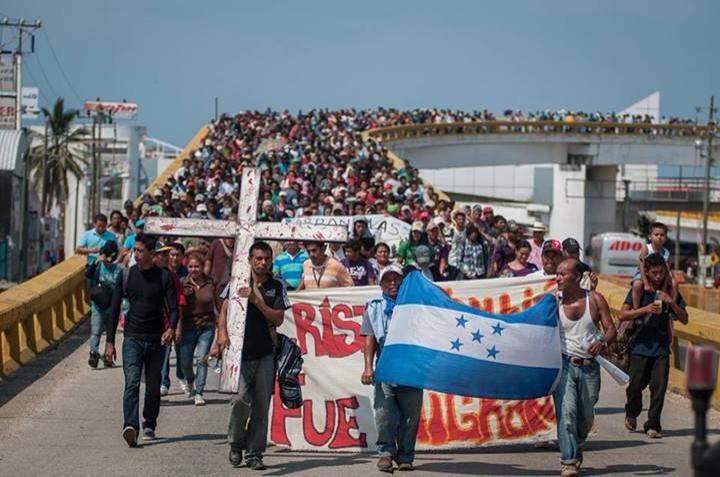Article begins
Mexico’s latest moves to criminalize solidarity would shut down knowledge production around transit migration.
On June 5, two veteran Mexican migrants’ rights activists were arrested at gunpoint. Both men, Irineo Mujica and Cristóbal Sanchez, have worked in solidarity with migrants in Mexico for more than a decade, and they were charged with the crime of tráfico, or human smuggling. The Mexican government accuses them of being coyotes.
The arrests of Cristobal and Irineo are the latest attempts to criminalize humanitarian aid and solidarity with migrants: the Department of Homeland Security has begun compiling a list of journalists, lawyers, and activists to target; the Scott Warren trial in Arizona conflates humanitarian aid with concealment; a German biologist faces 20 years in prison for rescuing migrants in the Mediterranean Sea. But Mexico is taking this to new depths. Although Mexico dropped the initial smuggling charges against Cristobal and Irineo, the investigation remains open and now the government may charge them with transporting irregular migrants. The government’s argument is that accompaniment is the same as transportation. Broadly invoked, this means walking alongside vulnerable migrants to keep them from being victimized by organized crime and corrupt officials, preparing food, offering shelter, and providing care for those without legal status would be criminal. These developments are chilling on their own, but so too are their implications: the criminalization of accompaniment is also an attack on the production of knowledge, particularly the day-to-day knowledge generated by accompanying migrants en route.
Those who seek to close borders would also like to close down knowledge production about those who seek to cross them.
Targeting accompaniment makes being there a crime. Being there is the purview of activists and researchers whose closeness enables us to tell the stories, analyze and explain what is going on, and we all hope, hold perpetrators accountable and contribute to structural change. Accompaniment is key to both keeping people safe in the immediate sense and recording the moment for future understanding.
El registro antropológico—activist/organizer/archivist


Migrant viacrucis turned caravan. Veracruz, Mexico. 2014. Amelia Frank Vitale
Irineo and Cristobal are integral, founding members of a migrants’ rights movement that has collectively contributed to making the vulnerable conditions of transit visible; they pushed for more humane, rights-centered legislation and shifted public opinion away from the idea that being a migrant is criminal. Meticulously documenting day-to-day events, communicating what it is like to move through this space between mobility and contention (Mezzadra 2012), has made this shift possible.
Irineo and I met in 2011, in the dining room-turned-cafeteria in a church-run shelter for Central Americans in Arriaga, Chiapas. The assembled group of migrants, activists, religious leaders, journalists, and academics were working on how to persuade the governor to guarantee safety for migrants who would soon move on, toward Oaxaca, and the governor was on his way. This was the first migrant caravan. It had the modest goal of accompanying Central Americans safely from Chiapas to Oaxaca, through a length of southern Mexico that was plagued with violent assaults against migrants. This tactic, which would be replicated and expanded over the years to come, was in large part Irineo’s genius, groundbreaking idea.
I met Cristóbal a few months later. He was turning a pile of donated mushrooms and a stack of tortillas into tacos. We were in Ixtepec, Oaxaca, at another shelter, and Cristobal was on kitchen duty. A few weeks after, we organized the second phase of that first caravan: accompanying migrants and their families who had been victims of kidnapping to the state of Veracruz, where they would give their testimonies to a representative of the Inter-American Court of Human Rights.
Activists like Cristobal and Irineo document, photograph, and bear witness to crimes committed against those most vulnerable, the people they are accompanying. They produce on-the-ground knowledge that competes with the narrative produced and disseminated by the media and the government.

Cristobal working on an exhibit of his photos of the caravans. San Pedro Sula, Honduras. 2018. Amelia Frank-Vitale
Cristobal is also a student at the Escuela Nacional de Antropología e Historia, conducting ethnography in the now well-established tradition of activist anthropology (Hale 2008). He accompanies migrants on their journey, and he also documents, photographs, and interviews, doing the “deep hanging out” of any good ethnographer. His work has been published, he has assisted investigators from abroad in conducting their fieldwork, and his knowledge has helped to free Central American women who were victims of sex trafficking but who had been convicted of being traffickers and imprisoned. While Cristobal and I were in the field together, Cristobal often reminded me to take more photos—”el registro antropológico, Amelia” —the anthropological record.
A now-famous photo that Irineo took demonstrates the importance of the documenting caravans. While accompanying migrants on top of the freight train, Irineo witnessed and photographed a brutal attack by Mexican security forces against a migrant. Irineo’s presence and the photo alerted Mexican civil society to the ways in which police forces were preying upon vulnerable migrants. The police smashed his camera, but he managed to retrieve the memory card. All parties involved understood the value of that data.
It is no coincidence that the closeness required to develop this kind of fine-grained knowledge is being criminalized. This knowledge is useful. It is critical to bringing human rights abuses to light and perpetrators to justice. And, in the case of Central Americans traversing Mexico, this knowledge can make the difference between winning an asylum claim or being sent back to a place where one’s life is in danger. Those who seek to close borders would also like to close down knowledge production about those who seek to cross them. As anthropologists, we need to share the close-up vantage point we have with an audience beyond the academy; our knowledge can offer a critical counter to the narrative that criminalizes and dehumanizes the people with whom we intimately work. And we must be vocal, public defenders of accompaniment and solidarity in all its forms.
Amelia Frank-Vitale is a doctoral candidate in anthropology at the University of Michigan, focusing on Central American migration and violence. Her current project documents how Honduran deportees reconfigure their lives and reimagine their futures after being returned to some of the world’s most dangerous neighborhoods. She has accompanied migrant caravans in Mexico since 2011.
Blanca Laura Cordero Díaz holds a PhD in sociology and an MA in social anthropology. She is a professor at the Benemérita Universidad Autónoma de Puebla, at the Institute of Social Sciences and Humanities. Her current areas of research include border regimes, violence and subjectivity, Central American migration, and social movements.
Cite as: Frank-Vitale, Amelia, and Blanca Cordero. 2019. “The Crime of Migrant Accompaniment?” Anthropology News website, July 15, 2019. DOI: 10.1111/AN.1223


